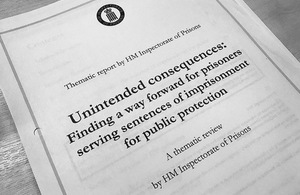HMIP report on sentences of imprisonment for public protection
The Parole Board is very concerned about the plight of many prisoners serving IPP sentences and welcomes the HMIP report.

The Parole Board is very concerned about the plight of many prisoners serving IPP sentences and welcomes the HMIP report.
Nick Hardwick Parole Board Chairman said:
“I very much welcome the publication of today’s report.
The Parole Board is a court like body and must act within the laws and rules laid down by Parliament. The rules state we can only release IPP prisoners when we are satisfied that it is no longer necessary for the protection of the pubic that they remain detained. Parliament has given the Justice Secretary powers to change the rules and I have given her a number of options about how that could be done, particularly for those prisoners who pose least risk.
The Parole Board is doing its part to make progress in reducing backlogs and releasing IPP prisoners who can demonstrate they are not a risk to the public. The number of IPP prisoners still in prison has reduced from over 6,000 in 2012 to 3,859 today. The Board released more IPPs than ever before in 2015-16, we currently complete around 40 IPP hearings a week and release about 40% of prisoners who come before us. Over 100 new Parole Board Members have now been appointed and as they start work will enable us to make further progress. I agree with the Chief Inspector of Prisons that significantly further and faster progress on the release of IPP prisoners would require decisions by the Justice Secretary.”
The Parole Board has recently published its strategic plan to take it to through the next four years to 2020, and one of the 5 over-arching aims is directly focused on the progression of IPP prisoners where it is safe to do so.
We have a series of initiatives to tackle some of the challenges, and these are already beginning to see results. Next week, the Parole Board Rules will be changed to allow the Board to release IPP prisoners ‘on the papers’ without an oral hearing. We have also changed our prioritisation framework to reduce waiting times for IPP, and other indeterminate prisoners. We have also just completed a recruitment campaign to recruit over 100 new members.
There are two specific recommendations in the report for the Parole Board and we will be ensuring we do everything we can to deliver on these.
Martin Jones, Chief Executive said:
“Whilst we are fully independent in our decision making, we are very keen to work with partners across the criminal justice system to deliver on the full set of recommendations in the report. The primary concern will always be protecting the public and we will only release IPP prisoners, where it is safe and appropriate to do so. The Parole Board is always mindful of the victim in every case it reviews.”
Notes to Editors
Statement on IPP prisoners from Parole Board Chairman, July 2016
The Parole Board is an independent body that works with its criminal justice partners to protect the public by risk assessing prisoners to decide whether they can safely be released into the community. The Board has responsibility for considering life sentence prisoners (mandatory life, discretionary life and automatic life sentence prisoners and Her Majesty’s Pleasure detainees; and prisoners given indeterminate sentences for public protection); and determinate sentence cases (discretionary conditional release prisoners serving more than 4 years whose offence was committed before 4 April 2005; prisoners given extended sentences for public protection for offences committed on or after 4 April 2005; and prisoners given an Extended Determinate Sentence after 3 December 2012). The Board considers initial release into the community and re-release following a recall to prison.
For further information please call Glenn Gathercole, Business Development Directorate on 0203 334 4392 during office hours, or 07725 927954 out of hours, or e-mail glenn.gathercole@paroleboard.gsi.gov.uk